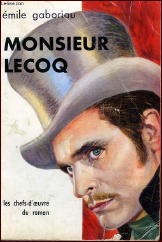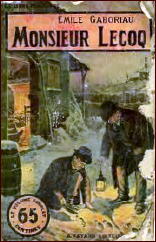Fri 29 Apr 2011
A 1001 MIDNIGHTS review: ÉMILE GABORIAU – Monsieur Lecoq.
Posted by Steve under 1001 Midnights , Reviews[9] Comments
by Edward D. Hoch
ÉMILE GABORIAU – Monsieur Lecoq. E. Dentu, Paris, 1868. Edited version published in the US: Dover, softcover, 1975.

Monsieur Lecoq, Gaboriau’s twelfth book and his fifth novel in which the French detective of the title appears, is today often considered his best and most readable book. Changing reading habits, plus indifferent translations, have left the pioneer French mystery writer all but unread today, but he deserves a place in any survey of classic detective fiction.
Lecoq, introduced in his first book as a secondary character, was a minor Sûreté detective with a shady past somewhat like the real-life Vidocq. But he soon takes center stage in the Gaboriau novels, and in Monsieur Lecoq he investigates a triple murder in a poor section of Paris.
The killer, apprehended at the scene, appears to be a petty criminal who calls himself May, but Lecoq suspects he might really have another identity. The duel of wits between the two men extends through the first volume of the novel.
The second volume, sometimes published separately as The Honor of the Name, is really a separate and inferior historical novel set around the year 1815, with Lecoq and the evasive villain only reappearing in the final twenty-two pages.

Though there have been numerous British and American editions of the novel, the recent Dover edition cited above (skillfully edited and introduced by E. F. Bleiler) is the first to eliminate the extraneous historical novel and jump at once from the end of volume one to the important final pages of volume two.
Gaboriau’s books are not without their weaknesses, and they often suffer from cardboard characterization and inconsistencies. Their strengths lie in plotting and background. They are not exactly the books we think of as detective novels today, but enough elements are present to argue effectively that Gaboriau deserves his title as the father of the detective novel.
Lecoq first appears as a secondary character in The Widow Lerouge (1866), but stars in his next two cases, The Mystery of Orcival (1867) and File No. 113 (1967). He also makes a brief appearance in The Slaves of Paris (1868), but this is more a crime novel than a detective story.
———
Reprinted with permission from 1001 Midnights, edited by Bill Pronzini & Marcia Muller and published by The Battered Silicon Dispatch Box, 2007. Copyright © 1986, 2007 by the Pronzini-Muller Family Trust.
April 30th, 2011 at 11:10 am
I enjoyed very much this sympathetic appraisal of Gaboriau’s important novel. His works are, alas, all but unread this days, at least by Anglo-Saxon critics.
The novels are long, but I was astonished at how readable they were when I took on the project of writing an essay on Gaboriau for Robin Winks’ “Mystery and Suspense Writers,” published by Scribner’s in 1998. Holmes, in “A Study in Scarlet,” had nothing but contempt for Gaboriau’s “Monsieur Lecoq,” a work that he claimed made him “positively ill.” Of course, he didn’t care for Dupin either, but I suppose that in both instances Holmes’ criticisms might be understood as territorial.
I was going to add that I might disagree with Hoch, who found some of the characterizations to be “cardboard,†but it’s been over a dozen years since I read the books and wrote my essay so I won’t press this point.
April 30th, 2011 at 12:56 pm
I’d have to admit that I’m one of those Anglo-Saxon guys who’s never read Gaboriau, but I might give the edited Dover version a try. I don’t generally care to read condensed or otherwise adulterated editions, but Bleiler is someone I can trust, of that I’m sure.
April 30th, 2011 at 5:49 pm
Might I second the recommendation for Gaboriau?
He is still a very good story teller, someone whose books still have genuine appeal.
My favorite of his is “The Mystery of Orcival”. The first 11 chapters are what we now recognize as a detective story. It is beautifully written, and full of interest.
Like the early detective stories of Poe, these are books that today’s readers would probably like.
May 1st, 2011 at 11:45 am
I second Mike’s recommendation of “The Mystery of Orcival”. Not only is it Gaboriau’s finest novel (exempt of all the weaknesses mentioned by Mr. Hoch) but it stands in my humble opinion as one of the finest mysteries ever written – even the long flashback (a Gaboriau trademark) is captivating and well integrated. Also worth reading is the posthumous novella “The Little Old Man of the Batignolles”.
May 1st, 2011 at 12:42 pm
The late great Claude Chabrol made a TV version of “Batignolles” in 2009:
http://www.imdb.com/title/tt1313591/
I haven’t seen it, but some friends who have really like it.
May 1st, 2011 at 5:59 pm
It’s odd with the current Victoriana rage that Gaboriau hasn’t been revived. Maybe it only applies to England (and English women writers preferably).
May 2nd, 2011 at 1:41 pm
Hi Steve,
I thought this French cover might be of interest to you; this is the edition that I own. The back cover (I couldn’t find any photo and I don’t have a scanner) is particularly interesting as it features endorsements by the likes of Peter Cheney, Joseph Kessel and Georges Simenon.
Bests,
X.
May 2nd, 2011 at 1:47 pm
Thanks, Xavier. That’s a great looking cover. It’s only too bad I don’t read French. I did in grad school, but the course I took was designed to read math texts, not literature by any stretch of the imagination, and what I knew then I certainly don’t now.
May 13th, 2019 at 12:08 pm
I am searching for the review on “The Widow Lerouge”.Can anyone help me by providing a link or review on it?
My mail id is : darkestlight.nisha@gmail.com